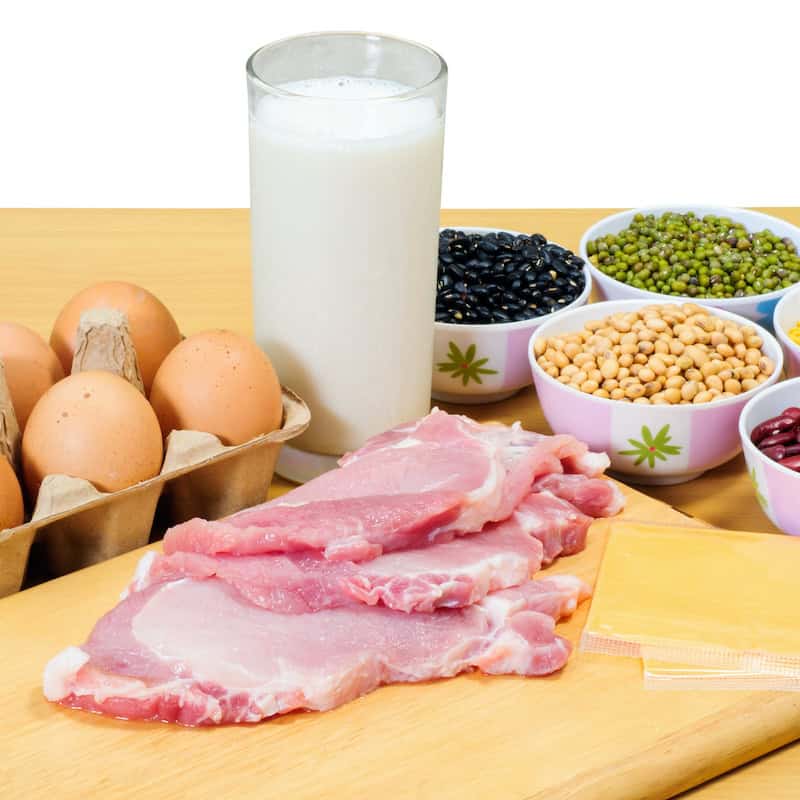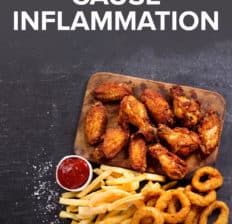This Dr. Axe content is medically reviewed or fact checked to ensure factually accurate information.
With strict editorial sourcing guidelines, we only link to academic research institutions, reputable media sites and, when research is available, medically peer-reviewed studies. Note that the numbers in parentheses (1, 2, etc.) are clickable links to these studies.
The information in our articles is NOT intended to replace a one-on-one relationship with a qualified health care professional and is not intended as medical advice.
This article is based on scientific evidence, written by experts and fact checked by our trained editorial staff. Note that the numbers in parentheses (1, 2, etc.) are clickable links to medically peer-reviewed studies.
Our team includes licensed nutritionists and dietitians, certified health education specialists, as well as certified strength and conditioning specialists, personal trainers and corrective exercise specialists. Our team aims to be not only thorough with its research, but also objective and unbiased.
The information in our articles is NOT intended to replace a one-on-one relationship with a qualified health care professional and is not intended as medical advice.
7 Foods that Cause Inflammation to Avoid (Plus Healthy Swaps)
February 13, 2025

There’s no doubt that diet plays a central role in regulating inflammation. In fact, a 2017 survey found that nearly one-quarter of those with rheumatoid arthritis reported that their diets impacted symptom severity. Even for those without an autoimmune disorder, limiting a few of the top foods that cause inflammation can be incredibly beneficial to overall health.
What is inflammation exactly? Inflammation is considered a defense mechanism used by the body to protect against illness and infection.
Although inflammation is a normal part of the immune process, more and more research has shown that chronic inflammation can contribute to disease, trigger pain and increase the risk of serious issues, like heart disease, cancer and diabetes.
What foods cause inflammation? In this article, we’ll take a look at a few of the foods that cause inflammation to avoid, plus some healthy swaps that you can make in your diet.
Foods that cause inflammation
Several ingredients have been shown to trigger inflammation and negatively impact overall health. Here are some of the top foods that cause inflammation.
1. Fried foods
Fried foods like doughnuts, mozzarella sticks and potato chips are high in trans fats, a type of unhealthy fatty acid that has been linked to a long list of side effects. In addition to cranking up cholesterol levels and increasing the risk of heart disease, cancer and diabetes, trans fats may also trigger inflammation.
According to one study in the Journal of Nutrition, increased consumption of trans fatty acids was associated with higher levels of markers of inflammation, including C-reactive protein (CRP) and interleukin-6 (IL-6).
2. Processed meat
Processed meat is any type of meat that has been smoked, cured, salted, dried or canned in order to enhance its flavor or extend its shelf life. Some of the most common examples include cold cuts, bacon, salami, sausage, hot dogs and beef jerky.
Not only was processed meat relatively recently classified as carcinogenic by the World Health Organization, but it can contribute to inflammation as well. Studies have shown that eating more processed meat may be tied to higher levels of CRP, a marker that is used to measure inflammation in the body.
3. Alcohol
Although certain types of alcohol (like red wine) can actually be beneficial in moderation, excessive alcohol consumption is a major risk factor for inflammation. Studies have shown that drinking high amounts of alcohol can increase certain inflammatory markers, including CRP.
What’s more, alcohol intake can also ramp up the risk of leaky gut syndrome, a condition in which toxins and food particles leak from the digestive tract into the blood, causing widespread inflammation.
4. Refined carbohydrates
Refined carbs like pasta, white bread, cookies and crackers are notorious as some of the top foods that cause inflammation of the joints. These foods undergo extensive processing, stripping them of beneficial nutrients, such as fiber.
Refined carbs also tend to have a higher glycemic index, which is used to measure how quickly foods increase blood sugar levels. Research has revealed that consuming foods with a high glycemic index may drive up inflammation, even in healthy adults.
On the other hand, studies also have relayed that swapping out refined grains for whole grains instead can decrease inflammation and protect against chronic disease.
5. Artificial sweeteners
Often lurking in low-calorie foods and diet products, some research has suggested that artificial sweeteners could cause inflammation. Although more research in humans is needed, studies have indicated that artificial sweeteners may disrupt the health of the gut microbiome, which plays a key role in regulating inflammation.
One animal model also found that regular consumption of sucralose, also known as Splenda, could cause liver inflammation in mice.
In addition, added sugars and extensive sugar intake have been labeled “an accomplice of inflammation” by health experts.
6. Vegetable oil
Heavily processed or refined vegetable oils are very high in omega-6 fatty acids. Although omega-6 fatty acids are an important component of a healthy diet, consuming a high ratio of omega-6 to omega-3 fatty acids can trigger inflammation.
While experts generally recommend aiming for a ratio of omega-6 to omega-3 fatty acids of around 4:1, most people consume a ratio closer to 15:1 instead. Therefore, limiting your consumption of refined vegetable oils while also adding more omega-3 fatty acids to your diet may help alleviate inflammation.
7. High-fructose corn syrup
High-fructose corn syrup is a type of sweetener that is often found in ultra-processed foods, including soda, juice, candy and ice cream. Just like regular sugar, high-fructose corn syrup is at the top of the inflammatory foods chart and can have detrimental effects on nearly every aspect of health.
One study out of Boston found that women who consumed more sugar-sweetened beverages had a higher risk of developing rheumatoid arthritis, a chronic inflammatory disorder that affects the joints.
Another study published in Nutrition & Diabetes also reported that increased consumption of drinks containing high-fructose corn syrup was associated with a higher risk of arthritis in adults ages 20-30 as well.
Anti-inflammatory food swaps
In addition to limiting your intake of foods that cause inflammation from the list above, incorporating a variety of foods that reduce inflammation into your diet can also be beneficial.
A healthy, well-rounded anti-inflammatory diet should include mostly nutrient-dense, whole foods, such as fruits, veggies, nuts, seeds and legumes. Herbs, spices, healthy fats and protein foods are also included on the anti-inflammatory foods list as well.
Making a few simple swaps in your diet is an easy way to get started. Try trading processed meats, for example, with healthier protein sources, like fish, poultry, eggs or legumes.
You can also ditch the deep fat fryer and try baking your own vegetable chips or French fries instead. Try swapping refined carbs like white rice, pasta or bread for whole grain varieties to give your diet an easy upgrade.
Here are a few of the best anti-inflammatory foods to include in your meal plan:
- Fruits: peaches, pineapple, mangoes, apples, berries, pears, oranges
- Vegetables: broccoli, kale, spinach, zucchini, squash, sweet potatoes, spinach, watercress, tomatoes, garlic
- Nuts and seeds: pistachios, macadamia nuts, almonds, chia seeds, flaxseeds, pumpkin seeds
- Legumes: black beans, kidney beans, chickpeas, lentils, navy beans, peas
- Whole grains: quinoa, couscous, farro, millet, buckwheat, barley
- Proteins: salmon, chicken, turkey, eggs, tempeh
- Healthy fats: coconut oil, olive oil, ghee, grass-fed butter, avocados
- Herbs and spices: turmeric, black pepper, rosemary, basil, oregano, cayenne pepper, dill
Looking for some simple ways to start adding these foods into your diet? Check out these anti-inflammatory diet recipes:
- Miso Soup with Mushrooms
- Spicy Roasted Pumpkin Seeds
- Cobb Salad with Avocado Dressing
- Crockpot Collard Greens
Frequently asked questions
What is inflammation?
Inflammation is the body’s natural response to injury, infection or harmful stimuli. It is a protective mechanism that helps heal damaged tissues and fight off pathogens.
There are two types of inflammation:
- Acute inflammation: A short-term response that occurs after an injury or infection, leading to redness, swelling, heat and pain.
- Chronic inflammation: A prolonged, low-grade inflammatory state that can contribute to various diseases, including heart disease, diabetes, arthritis and autoimmune conditions.
How do I know if I need to reduce my inflammation?
Signs that you may have chronic inflammation include:
- Persistent fatigue
- Joint pain or stiffness
- Digestive issues (bloating, gas or irregular bowel movements)
- Frequent infections
- Skin problems, like acne, eczema or psoriasis
- Brain fog or difficulty concentrating
- Unexplained weight gain or difficulty losing weight
A doctor can also check inflammation levels through blood tests, such as C-reactive protein (CRP) and erythrocyte sedimentation rate (ESR).
How do you flush inflammation out of your body?
To reduce inflammation naturally, consider the following:
- Eat an anti-inflammatory diet rich in fruits, vegetables, healthy fats (like olive oil and avocados) and omega-3s from fish.
- Stay hydrated to help flush out toxins.
- Exercise regularly to improve circulation and reduce inflammatory markers.
- Get enough sleep since poor sleep is linked to increased inflammation.
- Manage stress through meditation, deep breathing or yoga.
- Limit processed foods, sugar and unhealthy fats, aka foods that cause inflammation.
Does gluten cause inflammation?
Gluten can cause inflammation in people with celiac disease, non-celiac gluten sensitivity or wheat allergy. In these individuals, gluten triggers an immune response that leads to inflammation, digestive issues and other symptoms.
However, for those without sensitivity, gluten does not necessarily cause inflammation.
Do dairy foods cause inflammation?
Dairy affects people differently. Some studies have suggested that full-fat dairy, particularly fermented dairy like yogurt and kefir, may have anti-inflammatory effects.
However, for individuals who are lactose intolerant or have a dairy allergy, consuming dairy can trigger inflammation, leading to bloating, skin issues and digestive discomfort.
Can supplements help reduce inflammation?
Yes, several supplements have been shown to help fight inflammation, including:
- Turmeric (curcumin) is a powerful anti-inflammatory compound.
- Omega-3 fatty acids (fish oil) help reduce inflammation and support heart health.
- Ginger contains compounds that reduce inflammation and oxidative stress.
- Vitamin D plays a role in immune function and inflammation regulation.
- Magnesium helps lower inflammation and improve muscle function.
Conclusion
- Research has shown that chronic inflammation can contribute to serious conditions like heart disease, cancer and diabetes.
- What foods cause inflammation? Some of the top inflammatory foods to avoid include fried foods, processed meats, alcohol, refined carbs, artificial sweeteners, vegetable oils and high-fructose corn syrup. Ultra-processed foods and added sugars are also foods that cause inflammation.
- On the other hand, filling your diet with nutrient-dense, whole foods can help alleviate inflammation and protect against disease.
- Fruits, veggies, whole grains, legumes, nuts and seeds are all excellent options that you can incorporate into a nutritious anti-inflammatory diet.









